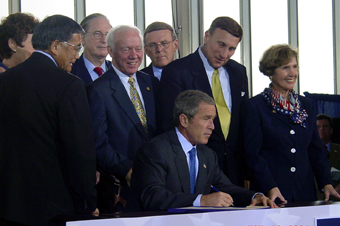Aviation and Transportation Security Act
Without a doubt, September 11 of 2001 was a day that changed the world forever. It shook millions upon millions around the world and left the aviation community in shock and pain. Therefore, the actions taken after 9/11 played a large role in shaping the aviation world that we know today. The Aviation and Transportation Security Act was introduced in U.S. Congress on September 21st and became law on November 19th of 2001 (Aviation and Transportation, 2001).

Within this legislation came many changes to the aviation industry, namely advancements in security. From this Act came the idea of TSA with "day-to-day Federal security screening operations for passenger air transportation" being noted (Aviation and Transportation, 2001, Section 101). Screening required that ANYTHING, whether that be people or objects, had to pass through a security screening before being released into the secure area of an airport to prevent weapons or terrorists from even getting close to a gate (Aviation and Transportation, 2001). This could be considered the most noticeable effect of the Aviation and Transportation Security Act as it is something we have all likely experienced at some point in our lives. Though it is often perceived as a hassle, we can remember that the idea of TSA came from what happened without TSA present - a tragic event.
Additional security measures such as requirements for locked and fortified cockpit doors, Federal air marshals and/or armed law enforcement being placed on commercial flights more regularly, particularly in cases that were "determined to present high-security risks" (Aviation and Transportation, 2001, Section 105). Training of airline flight crews was also enforced to ensure that crew members had an idea of what to do if a terroristic threat was detected while in flight. This legislation also called for the creation of advanced security technology, with a focus on bomb detection and baggage screening technology. This legislation didn't simply touch the United States though, international air carriers were advised to adopt such security measures, especially in the case that a flight was being operated to the United States (Aviation and Transportation, 2001).
One last interesting note on the legislation - of course, all of these changes weren't going to pay for themselves. So, with the Aviation and Transportation Security Act came a fee imposed on each passenger flying to, within, or out of the United States. At its introduction, the fee was put at $5.00 per one-way trip (Aviation and Transportation, 2001) Currently, that fee is $5.60 per one-way trip (Security Fees, n.d.).
In the end, the Aviation and Transport Security Act greatly changed the world of aviation, especially within the United States. 9/11 was such a horrific event that everyone knew that things had to change and the safety of those traveling by air had to be paramount. Although the world of aviation is now a bit more difficult to access, due to stringent security measures, it is all in place for a good cause. As long as the skies remain safe, the Aviation and Transportation Security Act is doing its job.
References
Aviation and Transportation Security Act, 107-17, U.S.C. § 1447 (2001)
Security Fees. (n.d.). Transportation Security Administration.
https://www.tsa.gov/for-industry/security-fees
Emily, great post for a tragic topic in aviation history. 9/11 has such an impact to this day that we sometimes forget that TSA and other security measures are because of that event. It is interesting to see the layers of security that have been added to terminals to prevent any further attacks, many believe it to just be the security checkpoint as you enter the airport but many don't see the hidden layers behind that. It is good to see safety as a number one priority for everyone. As with any job in the aviation industry I can see rules and regulations now set in place by the FAA for ATC and how it impacts the safety of any airport and airspace we may work. Great post!
ReplyDelete-TJ
Thanks TJ -
DeleteIt is pretty crazy to think about how 9/11 essentially changed the world overnight. But I think the steps and actions taken were warranted! It's reassuring to remember that these steps are in place to protect us....whether the TSA agent smiles at us as we pass through or not, haha! :)
This act greatly increased our security not just in United States but around the world. More training for ground security which included being able to identify insider threats, better equipment, advancements in technology for early detections, annual mandatory classes for all types of threats. Also like to add reductions of stress, overload, and etc. helped keep our ground security more aware of their surroundings.
Delete